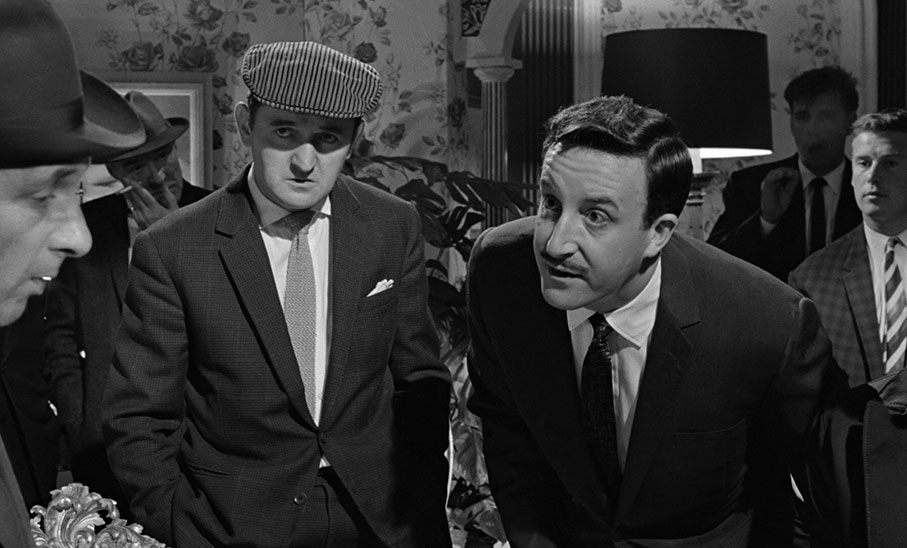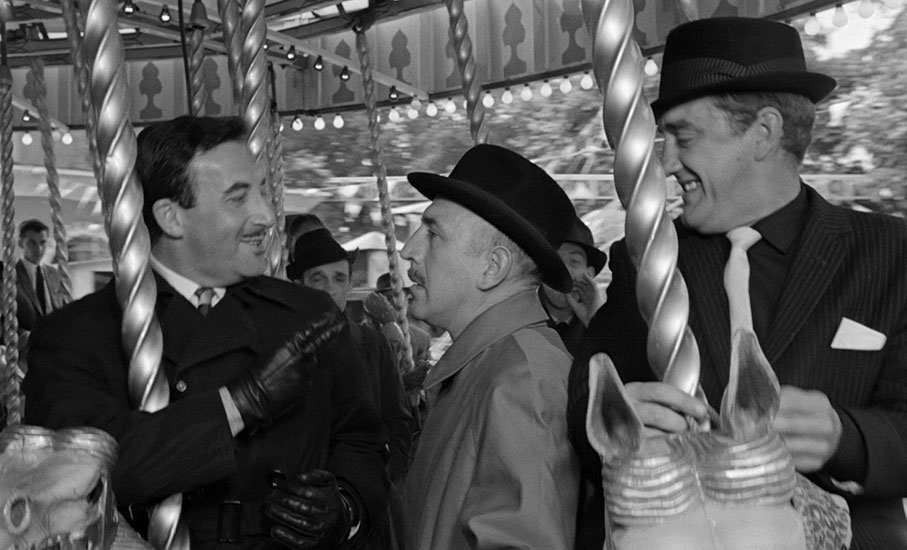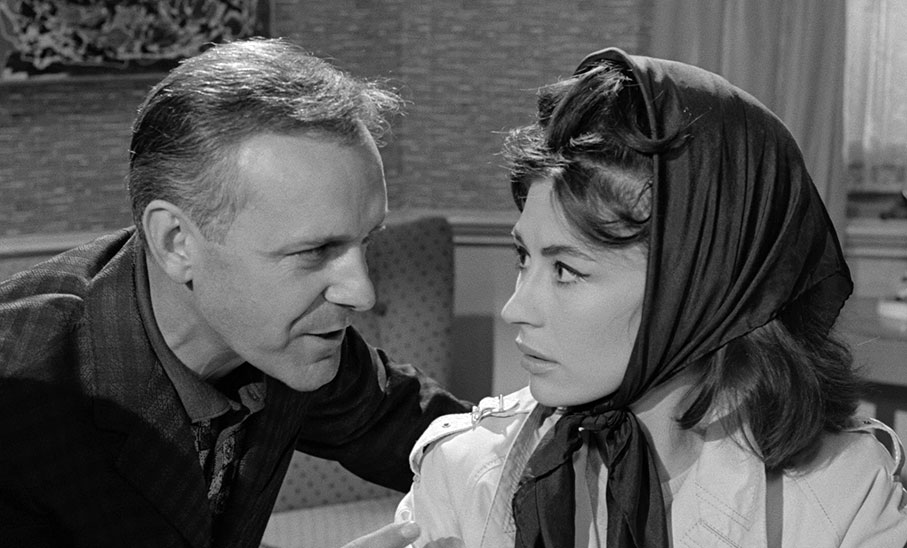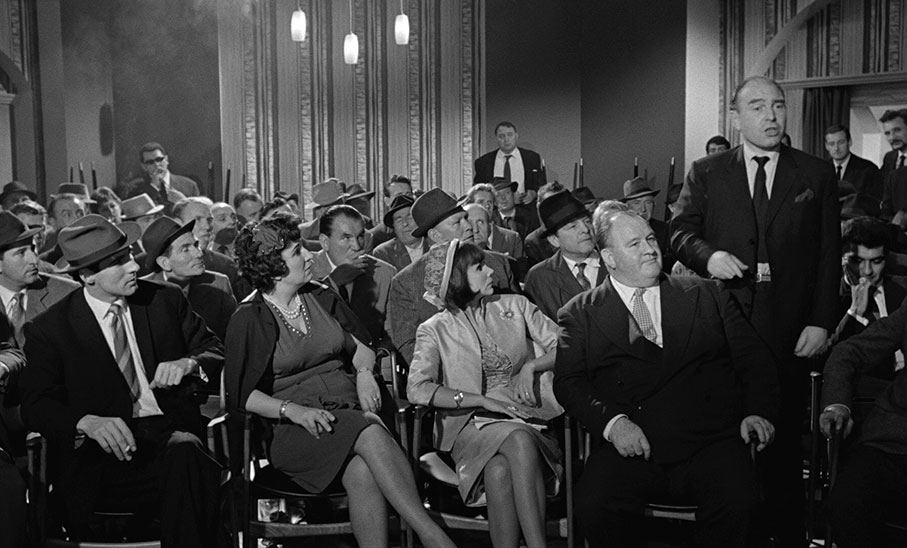|
In an unspecified corner of London, three likely lads hijack a postal van and steal its contents, unaware that a uniformed sergeant and two officers are waiting nearby in a concealed police patrol car. The policemen then discreetly follow the robbers as they change vehicles and deliver the goods to the rear entrance of a high class fashion house named Maison Jules. The thieves are just starting to count their spoils when the police burst in and confiscate the lot. When a radio message calls the Sergeant called back to the car, he orders the thieves to stay put until he returns. Surprisingly, they do, convinced that these representatives of law and order are simply waiting to duff them over when they attempt to escape, unaware that they have already departed with the loot.
In the showroom out front, meanwhile, popular French couturier Monsieur Jules (Peter Sellers) is in the process of convincing a well-to-do dowager (Irene Browne) that a doubtless expensive bridal dress will be perfect for her nervous wisp of a daughter. Jules seems perfectly capable of charming her into buying almost anything, and even offers to use his connections to find out what the other female guests at the wedding will be wearing. He ostensibly offers to do this to ensure the woman will not be upstaged by her social rivals, but he does seem overly interested in the information she provides about the wealthy guests and their fabulous jewels. We soon discover why. Just seconds after the woman and her daughter have departed, Jules is approached by his assistant, Annette (Irene Browne), who addresses him by a rather different name. “Pearly, the police have been here,” she quietly informs him. He responds not with a French “Pardon?” by a distinctly cockney, “What?” It quickly emerges that Monsieur Jules is the socially respectable alias of London criminal kingpin, Pearl Gates, and that his operatives have just been fleeced by what he describes as “the IPO caper,” IPO being an acronym for Impersonating Police Officers. We soon learn that the IPO mob in question consists of three Australian criminals who are looking to clean up in London before returning to their home turf as rich men. It’s also quickly revealed that the gang is getting detailed inside information on Pearly’s criminal activities from his Mata Hari of a girlfriend, Valerie (Natalie Newman).

As more of his operatives get hit by the IPO mob, Pearly’s anger and frustration grows, and when a job organised by fellow London crime boss, Nervous O’Toole (Bernard Cribbins), is also nobbled by the gang, a general meeting of the city’s organised criminal fraternity is called to discuss this threat to their collective income. With the police also frustrated and embarrassed by these three men who are committing crimes as law enforcement officers, the criminals elect Pearly to represent them in a proposed deal to halt all crime in the city for 24 hours so that Scotland Yard can focus exclusively on catching this disruption to the mutually accepted status quo.
The Wrong Arm of the Law is the kind of film that could only have been made in Britain in the 1950s or early 60s, one whose presentation of the opposing worlds of law enforcement and criminality in the capital city is based firmly in the world of quaintly innocent fantasy. Here, the criminal fraternity is more like an organised brotherhood, with all crime committed either by those working directly for the city’s two crime bosses or by loosely affiliated independent operators. Pearly runs his outfit like a benevolent employer, referring to his operatives as employees, paying for staff holidays in the Costa Brava, and showing them films like Rififi (“That’s that French one, innit?”), The Day They Robbed the Bank of England, and The League of Gentlemen as training material at regularly scheduled educational screenings. Although formerly rivals, Pearly and Nervous have recently formed a mutually beneficial crime syndicate that allots each of them specific days on which to carry out their activities in order to avoid stepping on each other’s toes. This new organisation even has its own set of formal regulations, which include defining the circumstances under which an extraordinary general meeting can be called. “Can we do that without a quorum?” Nervous asks when Pearly proposes that one be quickly convened to address their current problem, only for Pearly to consult the rule book he carries in his pocket and confirm that the required conditions have been met. The meeting itself is conducted like a local Trade Union conference, one in which Pearly and Nervous act as elected delegates, (male) colleagues are referred to respectfully as ‘brother’, votes are taken on motions, a gavel is banged to bring order, and those wishing to pass comment or ask questions raise their hands and introduced themselves by name and criminal speciality.
Representing Scotland Yard but doing their image no favours is Inspector ‘Nosey’ Parker (Lionel Jeffries), a nickname that Parker himself only uses when attempting to cosey up to uncooperative suspects, but is infuriated by when coined by an underling or the likes of Pearly Gates. His sycophantic sucking up to the Assistant Commissioner (John Le Mesurier), coupled with his overconfidence at his own abilities, irritates his immediate superior, Superintendent Forest (Martin Boddey), but amuses the hell out of Pearly and Nervous, who clearly have the smarts to run rings around him. While these two crime bosses seem unlikely to ultimately prosper thanks to the morally constricting movie convention of the day, it also seems certain that every suggestion made by the naively hopeful Parker is doomed to fail, in part because he’s just not as smart or as streetwise as the people he has been tasked with apprehending.

The casting and performances are absolutely spot-on. As both self-confident cockney criminal kingpin Pearly Gates and style-conscious French fashion designer Monsieur Jules, Peter Sellers is at the top of his considerable game here, and his ability to switch between the two personas in a heartbeat is one of the film’s many and varied pleasures. I wish I could recall the source of this, but I seem to remember watching a documentary in which it was claimed that Sellers worked to perfect not just an authentic French accent for Monsieur Jules, but a specifically Parisian one. Either way, he’s a genuine joy to watch throughout, whether it’s his snappy frustration at the activities of the IPO mob, his amusement at Parker’s folly, or his theatrical Français charms as Monsieur Jules. Mind you, he needs to be on top form to complete with Lionel Jeffries as the hapless Parker, whose his skill at matching animated line delivery to comically animated body language comes close to stealing some scenes from Sellers. Bernard Cribbins wears an inoffensive Irish accent as the amusingly twitchy Nervous O’Toole, while Nanette Newman comes close to pushing a boundary or two in her slow seduction of Pearly, all soft words, suggestive looks, gentle kisses and a loosening clothes designed to tease information from him, prompting the eventual surprised response, “Here, you’re getting a bit fresh, ain’t ya?”
The supporting cast is peppered with familiar faces, with the Australian IPO mob played by played by actual Aussie actors Bill Kerr, Ed Devereaux and Reg Lye, while the likes of Graham Stark, John Junkin, Arthur Mullard, Dermot Kelly and Barry Keegan are stand-out members of the two nicely cast main criminal crews. TV comedy star Dick Emery has an amusing but uncredited cameo as a man whose lovemaking is disturbed by a misdirected police raid, and a similarly uncredited Dennis Price is priceless as sophisticated con-man, Educated Ernest. Rumour has it that Michael Caine makes a fleeting appearance, either as a policeman or a gangster (opinions seem to differ), but try though I might, I’ve been unable to spot him.
The film is directed with brisk efficiency by Cliff Owen, most of whose work was in TV or feature film spin-offs of popular TV comedy series, Including Ooh... You Are Awful with Dick Emery, and the two big screen adventures of Morcombe and Wise. But the bedrock of the film is its cracking screenplay, the work of Hancock’s Half Hour and Steptoe and Son writers Ray Galton and Alan Simpson in collaboration with The Bed Sitting Room co-writer John Antrobus. A model of economy in its story setup, its dialogue is smart but in a manner that always feels appropriate to the personality of the characters the lines are assigned to, Thus, when IPO gang leader Jack Coombes (Bill Kerr) says, “They shipped enough crooks out to Australia. It's about time they had a few back here!” it amuses, but also sounds like something that a man like Coombes might actually say. The conviction of his delivery allows Sellers to sell a line like, “It’s all in the mind with me! I got things going round in here that would make Maigret drop his pipe!” without it coming across as a referential wink (you can save that for the Car 64, Where Are You? storybook being read by one of the coppers in the unusually quiet call centre). But my favourite exchange has always been one that takes place between Pearly and Parker on the funfair merry-go-round on which a meeting between police and criminal representatives has been arranged, though it does rely on the audience being aware that ‘bogey’ was a sla ng word for policeman in its day. As Parker edges unsteadily around the moving carousel to commence negotiations, a delighted Pearly and Nervous are shooting at each with their fingers like delighted children at play. Parker then says to Pearly in annoyance, “I suppose this is your idea of a joke. Battersea Funfair. Fancy having a meeting on a thing like this,” to which an amused Pearly pricelessly responds, “I must admit, the idea of a load of bogeys going round in circles did appeal to me, yeah.”

Inevitably, some dialogue does feel trapped in time, something disc distributor StudioCanal has acknowledged with a pre-film textual message warning of elements that some might find outdated or even offensive – better this than censoring the material in any way. Frankly, it’s largely minor league stuff when compared to some of the cinematic insensitivity of the day, being confined to lines like, “The chair recognises, um, the bird in the front row,” and the terms “Bosch“ and “Kraut’ coined briefly in reference to a late-story German crew member, Siggy Schmoltz, who though played by Norwegian actor Tutte Lemkow, is voiced by Peter Sellers.
But these are minor, age-related blips in what remains one of my favourite British comedies of its day, a consistently witty, impeccably cast, wonderfully played, and most engagingly structured caper that moves at a lick without ever feeling hurried, and builds to a farcical climax in which even this film’s cosy logic collapses in on itself, albeit to amusing effect. It’s a rare British film from the period that seems to have snuck a line past the presumably unaware censor – anyone my age will know that when Pearl berates Schmoltz for standing around like “a spare dick at a wedding,” the word “dick” does not mean “idiot.”* That said, the line that best encapsulates the film’s oh-so quaintly English portrayal of coppers and felons comes when Parker is first approached by Pearly about making a deal, and instantly picks up his office phone to have his visitor arrested for trying to bribe an officer. When he hears what Pearly is proposing, however, his expression instantly lightens and he instead says sweetly into his phone to the waiting desk sergeant, “Send in a nice pot of tea and a couple of fairy cakes, will you?”
The result of a new restoration that I’ve been able to find no specific details about, the 1.66:1, 1080p transfer on StudioCanal’s Blu-ray is absolutely first-rate. Boasting a crisply rendered image and a nicely balanced contrast range that retains shadow detail without softening the black levels, the picture is clean of dust and signs of wear and there is not a whisper of instability within frame. A really nice job.
The Linear PCM 2.0 dual mono track is also in fine shape, the age-related range restrictions only really noticeable on the shrill reproductions of a couple of high-pitched sounds. Otherwise, dialogue, effects and music are all clear and there is no distracting background hiss or fluff.
Optional English subtitles for the deaf and hearing impaired are available.
The Long Arm of the Screenwriter (19:43)
The Wrong Arm of the Law co-screenwriter John Antrobus, in what looks like (but may not be) a remotely recorded interview, looks back at how he first got into writing and how that ultimately led to him working with Ray Galton and Alan Simpson on the script for this film. He’s open about how alcoholism crept up on him before he kicked the habit, and also talks about the development of the play The Bed Sitting Room, which he wrote with Spike Milligan and was eventually filmed by Richard Lester.

Behind the Scenes Still Gallery (0:59)
12 monochrome behind-the-scenes photos, all of interest, but being a rolling gallery with no manual advance option, you’ll have to use the pause button if you want to examine any of them in detail.
Trailer(3:11)
A rather jolly trailer that does a fair job of selling the film’s many virtues, including its nicely drawn and animated opening titles.
A terrific script gives a fine set of performers some of their best roles in an old favourite from the tail end of a golden period for British film comedy, which has been handsomely restored for this Blu-ray release. Not much in the way of special features, but the interview with John Antrobus is most welcome. Warmly recommended.
|